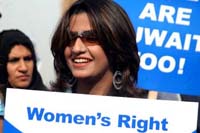Kuwaiti women take part in an election for the first time
For the first time in Kuwait's history, women voted and ran in a public election Tuesday. However, light turnout for the municipal by-election showed that persuading women to practice their newly won political rights was a difficult challenge.

"We have to prove we are worth the support we got," said a beaming Amal Hamad, a 40-year-old civil servant who had just cast her ballot for one of the two female candidates. "This is just the beginning."
The vote to fill one seat in the country's Municipal Council came almost a year after parliament passed a bill enfranchising women and enabling them to stand elections. Tuesday's vote was seen as a preview of how women might fare in next year's parliamentary elections.
Two women and six men contested the seat. Late Tuesday night, state-owned Kuwait television announced that Youssef al-Suweileh won the election with 5,436 votes. According to the initial unofficial results, 1,807 voters chose female candidate Jinan Boushehri, 32, who heads the food-testing section at the municipality.
The report did not announce turnout. Official results will be made public Wednesday.
The other female candidate, Khalida al-Kheder, 48, a U.S.-educated physician and a mother of eight, said she was disappointed by the low number of female voters.
Though slow in the morning, female voter turnout picked up a little in the afternoon but was not proportional to the number of women voters in the precinct. which accounted for 58 percent of the some 28,000 male and female registered voters.
Kuwaiti women are educated and have reached high positions in government and the diplomatic corps. But many are not interested in politics and see no need for entering a man's world.
The seat became vacant when the council's speaker, Abdullah al-Mhailbi, was appointed to the Cabinet in February. The council has 16 members 10 elected and six appointed by the government.
The two female candidates had to campaign without upsetting social and religious norms that discourage the mixing of the sexes. Seating at campaign tents and dinner buffets had to be segregated. Female campaign workers contacted women, and male helpers contacted men, reports AP.
O.Ch.
Subscribe to Pravda.Ru Telegram channel, Facebook, RSS!





